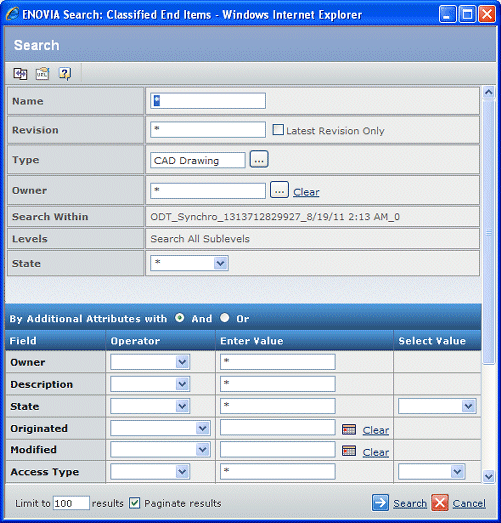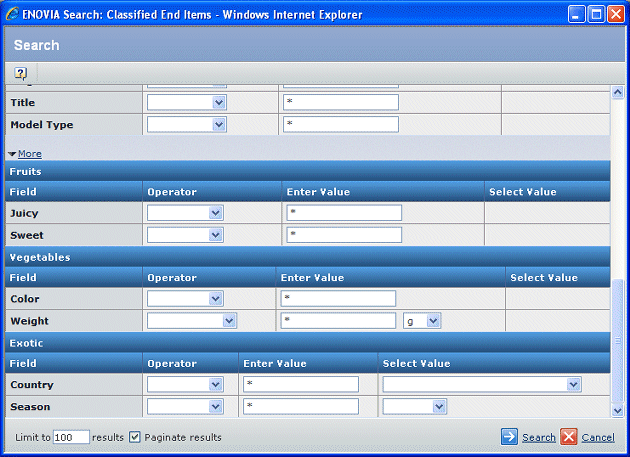Searching Within a Library or Folder | |||
| |||
View the properties page for a library, class, or folder.
Select Search Within from the page Actions menu or toolbar.

Enter basic search criteria. By default, all fields are case-sensitive. See Search Within for descriptions of the criteria fields.
To restrict the search results to specific attribute groups, select the name of the attribute group from the drop-down list on the toolbar. If this drop-down list does not show on the page, your system is not configured for this feature.
At the top of the advanced search section, select whether you want to use an "Or" search or an "And" search.
- Or. Search results contain items that include one or more of the specified attributes.
- And. Search results contain items that include ALL of the specified attributes.
For example, suppose you search for parts and specify the following attributes:
- Modified greater than Dec. 1, 2006
- Target Cost less than $1000
If you select "And," the search results contain only those parts that have been modified since Dec. 1, 2003 and have a Target Cost less than $1000.
If you select "Or," the search results will show all parts that have been modified since Dec.1, 2003, regardless of what their Target Cost is. It will also include all parts that have a Target Cost less than $1000, regardless of when they were last modified. "Or" searches often produce a larger number of results than "And" searches.

The attributes that display depend on the type of search.
For each attribute that you want to include in the search criteria, choose an operator and enter the data you want to search on:
-
Choose an Operator.
Attribute Type Operator Description Text attributes Begins with The system looks for attributes whose data begins with the text you enter (like including a wildcard * at the end of the text you enter). Ends with The system looks for attributes whose data ends with the text you enter (like including a wildcard * at the beginning of the text you enter). Includes The system looks for attributes whose data includes the text you enter (like including a wildcard * before and after the text you enter). Is exactly The system looks for attributes with data that exactly matches the text you enter (like not including a wildcard in the text you enter). Is not The system looks for attributes that do not contain the text you enter. Matches The system looks for attributes with data that matches text you enter. Numeric attributes Is at least, Is at most, Does not equal, Equals, Is between, Is less than, Is more than Date/time attributes Is on, Is on or before, Is on or after -
Enter the criteria in the Enter Value
column.
- If range values have been predefined for the attribute, a drop-down list is provided in the Select Value column.
- If the attribute has been configured with units of measure, a drop-down list shows next to the text box. You can search for any value/units regardless of the actual units used to store the data.
- For date attributes, click
 to select a date.
to select a date. - If you select Is Between for numeric values, include both values in the Enter Value field, separated by spaces.
-
Choose an Operator.
If entering criteria on a Part Family or Class Search Within page, enter criteria for child attributes:
-
Click More. The child attributes for the Part
Family or Class display on the page.
If no child attributes have been defined for the specific Part Family or Class, a message appears. Click OK to continue.
- Enter criteria as described above.
-
Click More. The child attributes for the Part
Family or Class display on the page.
In the Limit to field, you can enter the number of search results to display. The default is 100.
Paginate results is selected by default, but you can uncheck this item to display all your results on the same page.
Click Search.
The results Classified End Items Results page lists the results.